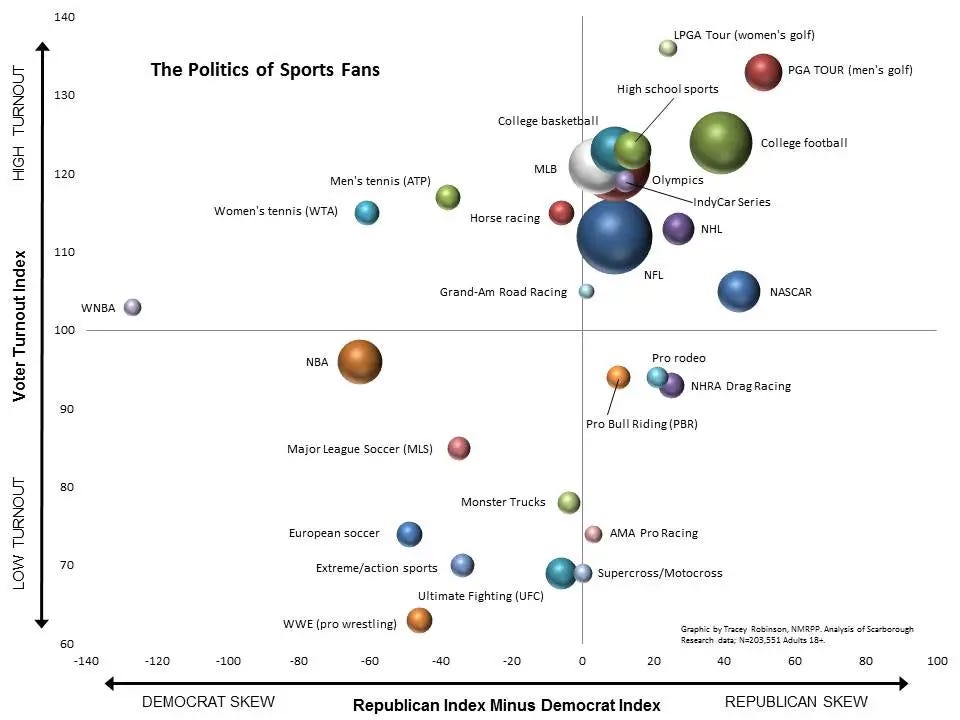"Turn around, head for the lights of town."
Sports organizations don't move away from cities because of crime. They move because they get more free money. It's the new trend in pubic stadium financing.
This week’s soundtrack: Nicole Atkins & Marissa Nadler - “Mr. Blue”
A note: This email is longer than usual, so you may have to click through to the web to get to the photos of Lulu
Ted Leonsis, the head of Monumental Sports and Entertainment, announced last week that he has reached an agreement with the state of Virginia to build a new complex to house his organization in Alexandria, just across the river from Washington, D.C. Assuming the agreement goes through – government being what it is and this being made possible by lots of public money, nothing is certain – the Capitals and Wizards will be moving to Virginia, with a home arena, offices and practice facilities being built there.
Not shockingly, people in D.C. are upset. Any time a team moves away (even if it’s a few miles away), it brings a lot of jobs and other economic stuff with it. In the case of this pending deal, the conversation about development, crime and urban/suburban divides has bubbled up.
Racism is often cited, rightfully, but I’d argue it’s not as cut and dry as it is made out to be. It is, as often happens, a perception/reality divide that is inherent with any conversation about crime. This came to the fore on Twitter when everyone’s least-favorite person tweeted about this local story.
It should go without saying that I think Kraushaar sucks, but he speaks for a lot of people. It doesn’t take much for suburbanites – sports radio callers are always calling from the suburbs – to get mad about “downtown” and rising crime. That sucks and it’s thinly-veiled “I’m afraid of poor and/or Black people” bullshit. But, Kraushaar is also not wrong as to the ways that suburbanites approach urban centers.
Crime is, after all, up in D.C. this year. While my least favorite mayor had a truly embarrassing performance this week in her presser about the potential move (one would’ve thought that she’d do some homework before such an imporant event, but then you wouldn’t know our mayor very well, which is how she doesn’t know which Metro lines go to the Gallery Place/Arena stop), she was correct to say that the 2022-2023 crime increase in the District is a blip. But that is neither the whole story nor the perception of people (particularly suburbanites looking for a reason to whine about ~downtown~) who go to games.
Three things can be true, all at once:
Crime in D.C. is, in fact, up year-over-year 22-23 (including an 88% increase in car thefts). That increase seems bigger because the 21-22 rates went down.
The people who are citing crime wouldn't give a flying shit if the Caps or, particularly, the Wiz were good teams.
Point 1 is often an excuse for point two and for, of course, the soft “I’m concerned about crime” racism that is lousy in America.
This is all a bummer, for sure, but it is reality. What’s funny is that it’s also not really part of this conversation between Leonsis, Virginia and the District. Leonsis, in the press conference, did not cite urban decay nor crime nor anything like that; he may think it – he is, after all, a very rich man with a large real estate portfolio – but that wasn’t an overt part of the move.
Rather, it’s money. Virginia gave him more money than D.C. did. Plain and simple.
Some (perhaps soul-crushing) background for the nostalgic amongst us:
Sport is, at its economic heart, an entertainment product. The billions of TV rights dollars that networks and streaming services spend on – and fight for – suggests that the proverbial eyeballs on sporting events are greater than that of almost any other entertainment product. Those eyeballs mean advertising, which means more money, which means the ~purity~ by which people care about sports needs to be dispensed with… and quickly. As the wise Ray Ratto has said, fans are seen as “wallets with legs” to team ownership, nothing more. This is why they do a million jerseyways, it’s why they put ads on the uniforms and on and on. If you have a question as to why something is being done in sports, the answer is almost certainly “money.” Before the streaming revolution (exacerbated by the COVID-19 pandemic), the closest analog was movies, but even that is a very poor comparison point. The NFL has both the top-rated show on television (Sunday Night Football) and the number six show (Monday Night Football); the Super Bowl is the top-rated single thing on TV by a huge margin every year (The Oscars is number two).
Even with that context, sports occupy a very particular place in American society and American cities that transcends just being an entertainment product. Lots of people do not care about sports and/or are not be interested in sports, which is perfectly reasonable, of course. Someone people prefer to watch other things on TV, some people like to read, some people prefer to go to museums or take in the symphony. That particular place is easy to encounter if you just talk to most fans; sports have a lot of impact on people that is unlike other forms of entertainment. There is no “we” formulation for fans of other forms forms of entertainment, so when someone's favorite Broadway show wins a Tony – unless that person worked on the actual show – they do not say, “we won a Tony.”
Capitals fans, on the other hand, said “we won the Cup” when the team won the Stanley Cup in 2018. Unlike the Tonys, sporting concerns get parades when they win a championship. Unlike the Grammys, the championship teams get to go to the White House and hang out with the president (thus giving us my favorite day of the big man’s presidency). Sports are outsized in this country, even knowing that we’re talking about an entertainment product.
The nostalgia is part of this, for sure. People grow up with sports – my earliest memories are of' ‘Hawks games with my dad at the old Chicago Stadium – and the teams make the experience more palpable to family audiences. Sports are, for better or worse, an integral part of people's lives. The teams are critical to their emotional wellbeing, their history, family connections and so many other things.
This melange – nostalgia, money, import, etc. – is easily exploitable by the very rich people who own sporting concerns. The threat of a team leaving town is how how public money gets thrown toward sporting endeavors more than they should.

The conversation around the Caps and Wizards moving back (as the teams were at the Capital Centre for years before moving downtown in the 1990s) to the suburbs tracks the seemingly timeless one about urban development and suburban fans. Quite simply, modern suburban residents want the benefits of a city without the downsides to living in a city. People who live in suburbs want to have the fun stuff of a city (restaurants, the aforementioned cultural institutions like museum and symphonies, sporting endeavors, etc.) without the bad things that cities bring (crime, traffic, homeless people, having to interact with people who aren’t like you are, etc.).
To get back to Kraushaa: It’s easy to complain about this group of fans, but they are the ones filling stadia. They are the wallets with legs. There is an online contingent of sports left-leaning fans (my friends, basically) who think that sporting concerns need or can be something different than what they actually: Very rich organizations squeezing as many dollars out of as many fans – of all political stripes – as possible. That means that it’s not gonna be a DSA meeting at the local NHL joint nor the local NBA gym; the NFL isn’t the only politically conservative fanbase
The old and oft-cited National Journal infographic speaks to this:
The above graphic was made before the NWSL was created, so that league isn’t on it. I can say, as a season ticketholder to the Washington Spirit, that the NWSL is, in fact, the most-progressive sporting concern around; if you want a truly leftist or progressive fan group, go to an NWSL game. The Spirit fan support sections wave the trans and iron front flags.
At NHL and NBA arenas, those flags would be confiscated as a matter of league policy. NHL and NBA (and MLB and NFL and so on) fans are more conservative, thus, more fearful of "crime" (both real and made up). Teams are now acting like those people.
Public stadium financing is ridiculous, for sure. The fact that a private business like Monumental would be shaking a tin cup for tax dollar help for property development purposes? That should make all of us livid. To reiterate my point above: Monumental is an entertainment concern; there’s not a world where Virginia is going to give hundreds of millions of dollars to the Baltimore Symphony Orchestra (Or the Folger Shakespeare Library) in order to get it to move to Alexandria. It’s bizarre.
But it is also reality.
Much has been written on this topic, of course. Earlier this year, Michael T. Friedman’s Mallparks – a terrific book on the topic of stadiums and the place that they hold in our collective society – was released. Comparing them to cathedrals and colosseums of previous empires, he analyzes the economic, cultural and other factors that have made stadiums what they are today. Using Henri Lefebvre’s and George Ritzer's theories, Friedman examines the trends around stadiums and the ways that these structures have become quasi-public spaces.
Where this is important to the Leonsis move is that Mallparks has a whole damned chapter on the Atlanta Braves moving from downtown to suburban Cobb County. The team’s move is the new trend in stadium demands. Teams are moving away from the mallpark of Friedman’s book to a model that resembles a planned commercial community (think subdivisions v. organic neighborhoods). In this case, the community is a mall called The Battery Altanta, which is technically adjacent to the stadium, but might as well be part of it.
This setup is the new trend (the Texas Rangers did this, the Chicago Bears are trying to do this, the Rams did it, etc.). The thing that comes to mind is a theme park; the Bauldrillardian notion of hyperreality come to fruition and The Battery Atlanta (which, again is not in Atlanta at all, but in a nearish suburb) is an encapsulation. It is a fake public space; the ultimate suburban notion of safety uber alles and built to make sure everyone is as comfortable as they can possily be in their consumption. In a way, it is a suburb in miniature, as it has all the things people like about cities and living in conglomerations without most of the bad things. It even has a bonkers-ass set of rules like it’s damned Six Flags or DisneyWorld:
This is, of course, very expensive. Truist Park cost nearly $700M – most of it public money – according to reports. Where this is concerning is not just the building of it, but the upkeep. To enforce that safety-first mindset that is inherent in these sports theme park places, public infrastructure (police, traffic controls and such) falls to the public to pay for. From Mallparks (emphasis is mine):
As with many stadium deals, there are significant financial costs beyond construction. As game days can attract more than forty thousand people, Cobb has additional public safety expenses related to traffic control, fire and ambulance protection, and policing. During Truist Park’s construction, the county spent more than $6 million to build a new firehouse to service The Battery Atlanta, purchase enhanced emergency communications equipment to respond to poten- tial stadium disasters, and acquire new patrol cars for the area. While ongoing expenses clearly include the additional costs to provide sufficient resources to protect public safety on game days, Cobb also needed to hire new police officers to ensure that events could be sufficiently staffed, without reducing resources in other parts of the county or having existing officers work overtime.
In the case of the Wiz and Caps, Alexandria will certainly have to come up with infrastructure to adjust. WMATA (the D.C. subway and public transit authority) – apparently, in the dark about the deal – has said that the station that is supposed to serve the future Monumental complex won’t be ready to do so anytime soon. In talking to a friend who used to cover Alexandria, that part of town is among the worst traffic spots in Northern Virginia, which means a lot more money is going to have to be spent than the already earmarked hundreds of millions that Virginia has promised to pony up.
The District’s 11th-hour proposal to renovate Capital One Arena certainly is expensive and calls for the same sort of infrastructure spending, but the fact is that a city has more capacity, a grander economy of scale and more public benefit to gain if these changes are made. More cops in the downtown of the capital city of the United States of America is hardly something people would decry (however much D.C. is already over-policed) and the capacity of better traffic controls is greater there. Simply put: More people benefit in more densely-populated places from these sort of changes.
Where does that leave us with the Caps and Wiz? It’s depressing, for sure, but it is the new thing in stadium ~innovation~. Leonsis wants his Battery Atlanta in addition to owning the downtown D.C. arena (at no point has he entertained selling the downtown arena that the teams currently inhabit). The people who are upset about “crime” would’ve been damned happy to keep living their sporting fan lives like a safari, but are even happier to live these lives like they’re going to fucking DisneyWorld instead.
Which brings us again to the notions of crime downtown. D.C.’s crime rate is up, for sure, but it is a small blip, comparatively; Alexandria’s crime rate is increasing year over year, albeit at a smaller rate. Ultimately, though, violent crime has been on the downturn for decades in the U.S.
Unfortunately, that’s mostly immaterial because the perception of crime is far more important than the actual crime. Look at NextDoor’s screaming concerns about package theft or greater crimes; they personalize the victims into real people. Everyone has an anecdote – I heard one about someone’s friend’s daughter who just moved to D.C. and saw an assault in the middle of the day! – about seeing or hearing of a crime downtown and it becomes a game of telephone and hyperbole.
(I say this all from a birds’ eye view, of course. As mentioned above, I’m well aware that car theft is up 89% in D.C. since last year and I joke with other D.C. residents about how I’m shocked my car hasn’t been stolen. Those numbers are real. But they don’t mean that we’re all going to get our cars stolen tomorrow nor is every suburbanite going to be carjacked when they go to dinner at one of D.C.’s many Michelin starred restaurants.)
Robert H. Jordan’s Murder in the News is an excellent read on the ways that local TV news learned how to build fear in viewers, thus keeping them watching.
When cases are sensationalized in news coverage they soar to the top of the public interest scale. As mentioned earlier, these “sensational” stories have certain “innate” elements about them that catch the attention of reporters and editors.
As noted above, none of these anecdotes would matter if the Caps and/or Wiz were great. The sports radio callers who complain about crime would absolutely be at the games if either team was at the top of the standings; no one gave a shit about the Nats’ stadium during the World Series run. It’s an excuse, plain and simple. The non-racist, non-suburban analog is the price of going to an event. Everyone moans about stadium beer/parking/ticket prices until a team goes on a playoff run. The Warriors have the most-expensive ticket in the NBA and they have no problems filling the arena; price and crime are excuses for marginal people not to go to games.
Building a good team, of course, is much harder than hoodwinking Virginia into giving a billionaire free money. Leonsis is good at the latter and mostly sucks at the former. People in Bethesda and Fairfax and such can blame crime all they want, but it’s the teams – and the way we finance stadiums – that suck, not downtown D.C.
Lulu Update
I am definitely an idiot who buys his dog eight different toys fr each night of Chanukah. Here is a selection of a few of them.
It’s really good that I don’t have children; they would be the most entitled Veruca Salt/Augustus Gloop-ass kids who ever lived.
I also torture her with the Chanukah PJs. She hates wearing clothes.
A Recommendation: Snow
We had a tiny bit of snow here in D.C. last week and it was invigorating. The changing of the seasons is something that cultures have celebrated since the dawn of time; from Stonehenge to the harvest festivals of ancient societies. Snow, in places where we get it, is a beautiful manifestation of these seasons changing.
And it’s beautiful! I love snow! It looks nice. I know it sucks to drive in it, but there’s a reason that there are so many gorgeous photos and paintings of snow-covered landscapes. I wish we had more of it here in D.C. I gotta move to Buffalo or the Yukon or something.









